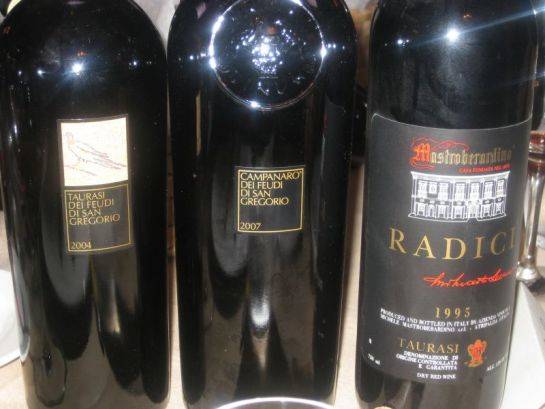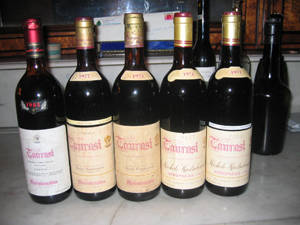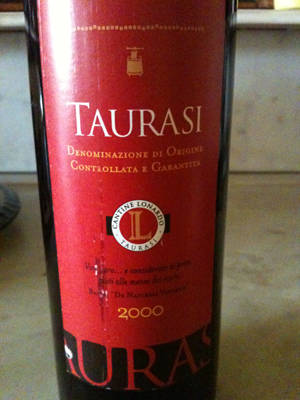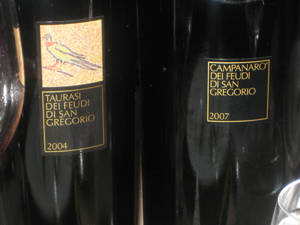Taurasi: The Noble Red Wine Of Italy
When I want to know anything about the wine and food of Naples and Campania, I ask Maurizio de Rosa. I am not the only one to take advantage of his knowledge. Mr. de Rosa was born in Naples and his mother still lives there. Marurizio is now the export manager for Feudi di San Gregorio, one of the leading producers in the region.
I asked Maurizio, who is writing a book on Taurasi wines which will be out at the end of the year, to be the guest speaker at a tasting and lunch featuring Taurasi for the Wine Media Guild at Felidia Restaurant. He agreed and said he would supply the wines and group the producers according to the vineyards where they sourced their grapes because, just like the crus in Barolo, different vineyards give a different character to the wine. There were 19 wines from 19 different producers.
There are many great red grape varieties in Italy but three seem to stand out above the rest. They are Nebbiolo, Sangiovese and Aglianico. Aglianico finds its greatest expression in Taurasi in Campania and Aglianico del Vulture in Basilicata. In fact Taurasi is produced less than 40 miles from Aglianico del Vulture.
Aglianico was brought to Southern Italy by the Greeks and many believe that its name comes from “Hellenico”. Jeremy Parzen has an excellent article “Aglianico does not equal Ellenico” at dobianchi.com and Mr. de Rosa seemed to agree with his interpretation. Jeremy also has another article on the origin of the name “Taurasi”.
Mr. De Rosa said the Aglianico grape thrives in vineyards of very high altitudes of 400 to 500 meters above sea level. The vineyards for Taurasi are located in the Province of Avellino. Total area is about 750 hectares of volcanic soil. He went on to say that the volcanic soil of the Taurasi region demonstrates the potential of the Aglianico grape as one of the best in Italy.
Taurasi was awarded the DOC in 1970 and the DOCG in 1993. Taurasi must be aged for at least three years before it is released, with at least one year in wood. The Riserva must be aged at least four years. It must be at least 85% Aglianico and 15% of Piedirosso, Barbera and Sangiovese can be blended in. In my opinion the best is made from 100% Taurasi but I do not mind a little piedirosso being added.
The five-star vintages of Taurasi that can still be found are: 1968,1977,1985,1987,1988,1990, 1993,1997,1999, 2001 and 2004.
My favorite wines overall at the tasting came from producers that obtained grapes from vineyards in Castelvetere Sul Calore, Paternopoli, Castelfranco and Monteramarano.
Maurizio said that most of the vineyards in this area were over 500 meters and it was the most homogeneous so that the terroir was very important. Except for the Montemarano area which had a less southern exposure. There is clay soil here rich in piroplastiti. The grapes ripen later here and the harvest usually takes place in mid-November. The higher the altitude the more complex the wine and he pointed out that the grapes here are more vibrant with higher tannic expressions. I liked all five of the wines from this zone but the Perillo and Molettieri were really outstanding.
Urciolo “Monte Faliesi” 2005 (Castevetere) $45
Perillo 2003 (Castelfranci) $60
Boccella 2005 (Castelfranci) $56
Molettieri “Cinque Querce” 2005 (Monteramarano) $55
Castello dei Monaci “Monaco Rosso” 2003 ( Monteramarano) $?
These grapes from the vineyard from Pietradefusi,Torre Le Nocelle, Venticano, Montemietto and Montefalcione were at elevations of 300-500 meters. The soil has a clay component and co-exists with marly limestone layers in lose layers. More extreme hydrostress. The harvest here is early and is normally completed by the middle of October. I liked four wines from this zone.
D’Antiche Terre 2004 (Pietradefusi) $95
Villa Raiano 2005 (Venticano) $50
Cantina Crogliano “Santo Stefano” 2002 (Montefalcione) $?
Romano Clelia “Vigna Andrea” 2005( Lapio) $43
Producers harvesting from vineyards in Mirabella Eclano, Fontanarosa, Sant’Angelo All’Esca and Taurasi. The vineyards are 350-500 meters from Mirabella Eclano to Fontanarosa respectively. It is a more diversified zone. The soil here is clay with layers of limestone and sand but there is a difference in the various terroir and therefore the style of the producer is more important in this zone.
From this zone I liked two wines
Lonardo “Contrade di Taurasi” 2001 (Taurasi) $70, this is a big wine and my favorite of the tasting.
Di Prisco (Fontanarosa) $?
Mixed Areas -The grapes for these wines came from two different zones for example the Di Meo Riserva 2001 has grapes from the Taurasi and Montemarano zones. $38
When we sat down to lunch besides drinking what was left of the Taurasi, we had the Feudi San Gregorio “Campanaro” 2007. It is mostly Fiano di Avellino with a small amount of Greco di Tufo $ 45. It went very well with the first course.
Mr. de Rosa, with the use of slides and his vast knowledge of the Aglianico grape and of Taurasi in particular, gave a truly interesting and informative presentation.






































i-Italy
Facebook
Google+
This work may not be reproduced, in whole or in part, without prior written permission.
Questo lavoro non può essere riprodotto, in tutto o in parte, senza permesso scritto.